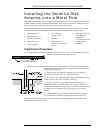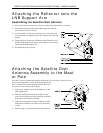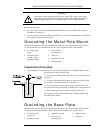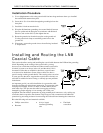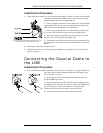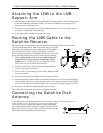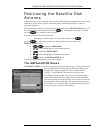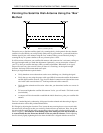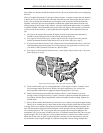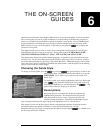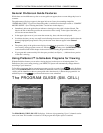
INSTALLING AND POINTING YOUR SATELLITE DISH ANTENNA
PAGE 4-19
mark. Make sure that the satellite dish antenna doesn’t slip out of position while you are tightening
the bolts.
Next, we’ll adjust the azimuth. For this part of the procedure, a compass (such as the one included
in the Do-It-Yourself Installation Kit) will make it possible to point in the proper direction. This is
done by first loosening the azimuth bolts just enough in order to turn the satellite dish antenna
smoothly with a little pressure. Stand behind or beneath the satellite dish antenna reflector and,
while grasping the outer edges of the reflector, rotate the satellite dish antenna until it is pointing
toward the azimuth value determined earlier (result minus 10 degrees). Be sure that as you do this
you do not lean on the reflector, as that would affect the alignment. Don’t tighten the bolts just
yet!
1) Slowly turn the satellite dish antenna 20 degrees towards and past the actual determined
azimuth. It should take about 20 seconds to make the sweep of the sky.
2) If no signal was found in this pass, increase the elevation by 1 degree and slowly turn the
satellite dish antenna back the other direction. If you do find a signal, go to step 5.
3) If you have done this for 9 passes (now 4 degrees above the determined elevation), start back
at the beginning point and try again. If you cannot achieve any signal after several tries, call
your dealer or the Customer Care Center at 1-800-274-8995.
4) If no signal is found, increase the elevation by 1 more degree and go back to step 1. If you do
find a signal, go to step 5.
5) To have reached this step it is assumed that there is some degree of signal. A numeric value
for the strength ranges from 0 to 99. While your signal strength may vary, refer to the
following map to determine the suggested signal strength goal for your area:
6) Gently continue turning the satellite dish antenna reflector a small amount as you were
turning it when you began receiving a signal. Continue to adjust the satellite dish antenna in
this fashion until the signal strength meter reaches the highest possible reading. Tighten the
azimuth bolts.
7) Slowly tilt the satellite dish antenna up and down to try to improve the signal strength reading.
When you are satisfied that you have achieved the strongest signal, tighten the elevation bolts.
You may choose to try different transponders. Each transponder transmits multiple programs at a
time. The transponder displayed when entering the screen represents the one associated with the
last viewed program (or “02” if no program has been viewed). By moving the highlight to the
transponder area, you can enter a number from 01 to 32. Different transponders may show varying
signal strengths. This is not indicative of any problem unless the variations are extreme (such as
40 and 90). In the event of signal reception problems, customer service representatives may ask
for information such as signal strength on a different transponder. Do not change transponders
Typical signal strength results. Your actual signal strength may vary.



